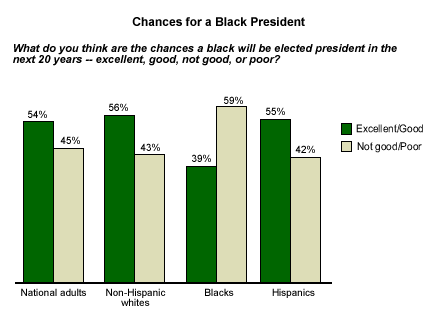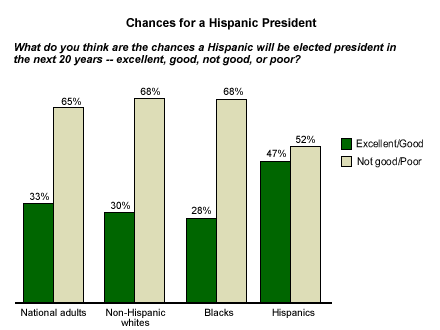In connection with the U.S. Supreme Court's important decision on affirmative action in higher education, there has been much discussion about the need for corporate America to be able to serve diverse cultural markets. But what about the American government? What do Americans currently think about the chances of a nonwhite candidate rising to the highest U.S. government offices -- the presidency in particular? Opinions vary widely on this subject, especially among different racial and ethnic groups.
Chances of a Black President
The possibility of a black president in the Oval Office seems increasingly real. Current Secretary of State Colin Powell, one of the most favorably rated political figures according to Gallup Polls, has long been thought of as a prime candidate for the presidency. Additionally, in recent years, blacks have run in both parties' presidential primaries, including a strong showing by Jesse Jackson for the 1988 Democratic presidential nomination. When asked to assess the chances of a black candidate being elected president in the next 20 years*, slightly more than half of Americans (54%) think the chances are "excellent" or "good," while 45% feel they are "not good" or "poor." Public sentiment on this question seems to have changed little in recent years, as these results are nearly identical to findings from 10 years ago.
Interestingly, black Americans are much more skeptical of the chances of a black being elected president in the near future. Just 39% of blacks say the chances of this happening are excellent or good, significantly lower than the 56% of white Americans and 55% of Hispanics who say this.

A Hispanic in the White House
The burgeoning Hispanic population in America, now the largest minority group in the United States, carries so much political clout that Al Gore and George W. Bush both spoke Spanish during various campaign stops in the last presidential election. But at this point, most Americans feel that the odds of a Hispanic president being elected in the near future are slim.
Just a third of Americans (33%) believe the chances of a Hispanic being elected president are excellent or good, while 65% say the chances are not good or poor. But unlike the black population, Hispanics are more optimistic than the general public on this issue. Forty-seven percent of Hispanics rate the chances of a Hispanic being elected president as excellent or good, compared with 30% of whites and 28% of blacks.

Bottom Line
It is difficult to make generalizations regarding public opinion on the prospects for a minority president. While black candidates have already become part of America's political process, and more than half of the public believes the chances of a black being elected president in the next 20 years are at least good, blacks themselves are the most pessimistic about the possibility.
Americans are less inclined to believe that the chances for a Hispanic president are good, but unlike blacks, Hispanics are more optimistic than the general public about the prospects of one of their own being elected.
*Results are based on telephone interviews with 1,385 national adults, aged 18 and older, conducted June 12-18, 2003, including oversamples of blacks and Hispanics that are weighted to reflect their proportions in the general population. For results based on the total sample of national adults, one can say with 95% confidence that the maximum margin of sampling error is ±3%.
Results for the sample of 668 men, aged 18 and older, are based on telephone interviews conducted June 12-18, 2003. For results based on the total sample, one can say with 95% confidence that the margin of sampling error is ±4%. [Results for Q.1-10 based on June 12-15 sample of 489 men; the maximum margin of sampling error is ±5%.]
Results for the sample of 717 women, aged 18 and older, are based on telephone interviews conducted June 12-18, 2003. For results based on the total sample, one can say with 95% confidence that the margin of sampling error is ±4%. [Results for Q.1-10 based on June 12-15 sample of 517 women; the maximum margin of sampling error is ±5%.]
Results for the sample of 821 non-Hispanic whites, aged 18 and older, are based on telephone interviews conducted June 12-15, 2003. For results based on the total sample, one can say with 95% confidence that the margin of sampling error is ±4%.
Results for the sample of 241 blacks, aged 18 and older, are based on telephone interviews conducted June 12-18, 2003. For results based on the total sample, one can say with 95% confidence that the margin of sampling error is ±7%.
Results for the sample of 266 Hispanics (including 12 Hispanic respondents who identify their race as black), aged 18 and older, conducted June 12-18, 2003. For results based on the total sample, one can say with 95% confidence that the margin of sampling error is ±7%. (53 out of the 266 interviews with Hispanics were conducted in Spanish).
In addition to sampling error, question wording and practical difficulties in conducting surveys can introduce error or bias into the findings of public opinion polls.
